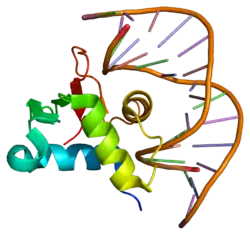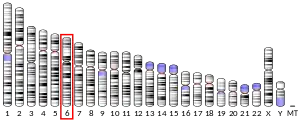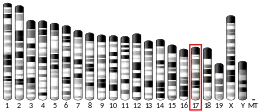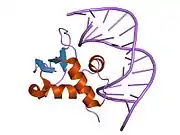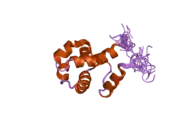SPDEF
SAM pointed domain-containing Ets transcription factor is a protein that in humans is encoded by the SPDEF gene.[5][6][7]
PDEF is an ETS transcription factor expressed in prostate epithelial cells. It acts as an androgen-independent transactivator of PSA (MIM 176820) expression.[supplied by OMIM][7]
References
- GRCh38: Ensembl release 89: ENSG00000124664 - Ensembl, May 2017
- GRCm38: Ensembl release 89: ENSMUSG00000024215 - Ensembl, May 2017
- "Human PubMed Reference:". National Center for Biotechnology Information, U.S. National Library of Medicine.
- "Mouse PubMed Reference:". National Center for Biotechnology Information, U.S. National Library of Medicine.
- Oettgen P, Finger E, Sun Z, Akbarali Y, Thamrongsak U, Boltax J, et al. (January 2000). "PDEF, a novel prostate epithelium-specific ets transcription factor, interacts with the androgen receptor and activates prostate-specific antigen gene expression". The Journal of Biological Chemistry. 275 (2): 1216–1225. doi:10.1074/jbc.275.2.1216. PMID 10625666.
- Johannessen JV, Finseth I (January 1983). "Electron micrographs in five minutes". Ultrastructural Pathology. 4 (1): 97–100. doi:10.3109/01913128309140576. PMID 6857767.
- "Entrez Gene: SPDEF SAM pointed domain containing ets transcription factor".
- Chen H, Nandi AK, Li X, Bieberich CJ (January 2002). "NKX-3.1 interacts with prostate-derived Ets factor and regulates the activity of the PSA promoter". Cancer Research. 62 (2): 338–340. PMID 11809674.
Further reading
- Lance V (1976). "Studies on the annual reproductive cycle of the female cobra, Naja naja. Seasonal variation in plasma inorganic ions". Comparative Biochemistry and Physiology. A, Comparative Physiology. 53 (3): 285–289. doi:10.1016/S0300-9629(76)80037-0. PMID 2437.
- Yamada N, Tamai Y, Miyamoto H, Nozaki M (January 2000). "Cloning and expression of the mouse Pse gene encoding a novel Ets family member". Gene. 241 (2): 267–274. doi:10.1016/S0378-1119(99)00484-9. PMID 10675039.
- Chen H, Nandi AK, Li X, Bieberich CJ (January 2002). "NKX-3.1 interacts with prostate-derived Ets factor and regulates the activity of the PSA promoter". Cancer Research. 62 (2): 338–340. PMID 11809674.
- Thompson HG, Harris JW, Wold BJ, Lin F, Brody JP (April 2003). "p62 overexpression in breast tumors and regulation by prostate-derived Ets factor in breast cancer cells". Oncogene. 22 (15): 2322–2333. doi:10.1038/sj.onc.1206325. PMID 12700667.
- Feldman RJ, Sementchenko VI, Gayed M, Fraig MM, Watson DK (August 2003). "Pdef expression in human breast cancer is correlated with invasive potential and altered gene expression". Cancer Research. 63 (15): 4626–4631. PMID 12907642.
- Ghadersohi A, Odunsi K, Lele S, Collins Y, Greco WR, Winston J, et al. (February 2004). "Prostate derived Ets transcription factor shows better tumor-association than other cancer-associated molecules". Oncology Reports. 11 (2): 453–458. doi:10.3892/or.11.2.453. PMID 14719083.
- Chen H, Bieberich CJ (January 2005). "Structural and functional analysis of domains mediating interaction between NKX-3.1 and PDEF". Journal of Cellular Biochemistry. 94 (1): 168–177. doi:10.1002/jcb.20297. PMID 15523673. S2CID 46494570.
- Wang Y, Feng L, Said M, Balderman S, Fayazi Z, Liu Y, et al. (May 2005). "Analysis of the 2.0 A crystal structure of the protein-DNA complex of the human PDEF Ets domain bound to the prostate specific antigen regulatory site". Biochemistry. 44 (19): 7095–7106. doi:10.1021/bi047352t. PMID 15882048.
- Fowler M, Borazanci E, McGhee L, Pylant SW, Williams BJ, Glass J, et al. (January 2006). "RUNX1 (AML-1) and RUNX2 (AML-3) cooperate with prostate-derived Ets factor to activate transcription from the PSA upstream regulatory region". Journal of Cellular Biochemistry. 97 (1): 1–17. doi:10.1002/jcb.20664. PMID 16237704. S2CID 20541109.
- Gunawardane RN, Sgroi DC, Wrobel CN, Koh E, Daley GQ, Brugge JS (December 2005). "Novel role for PDEF in epithelial cell migration and invasion". Cancer Research. 65 (24): 11572–11580. doi:10.1158/0008-5472.CAN-05-1196. PMC 2919290. PMID 16357167.
- Rodabaugh KJ, Mhawech-Fauceglia P, Groth J, Lele S, Sood AK (January 2007). "Prostate-derived Ets factor is overexpressed in serous epithelial ovarian tumors". International Journal of Gynecological Pathology. 26 (1): 10–15. doi:10.1097/01.pgp.0000225386.41244.bd. PMID 17197890. S2CID 25880565.
- Park KS, Korfhagen TR, Bruno MD, Kitzmiller JA, Wan H, Wert SE, et al. (April 2007). "SPDEF regulates goblet cell hyperplasia in the airway epithelium". The Journal of Clinical Investigation. 117 (4): 978–988. doi:10.1172/JCI29176. PMC 1810569. PMID 17347682.
This article is issued from Wikipedia. The text is licensed under Creative Commons - Attribution - Sharealike. Additional terms may apply for the media files.
